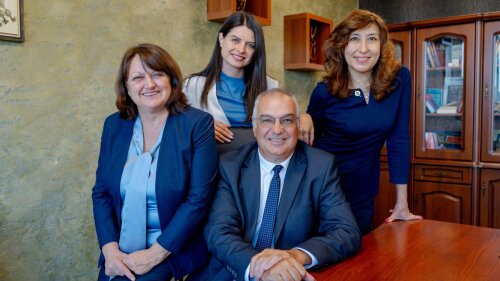Best Collaborative Law Lawyers in Veliko Tarnovo
Share your needs with us, get contacted by law firms.
Free. Takes 2 min.
Free Guide to Hiring a Family Lawyer
List of the best lawyers in Veliko Tarnovo, Bulgaria

About Collaborative Law in Veliko Tarnovo, Bulgaria
Collaborative law is an alternative dispute resolution process that prioritizes cooperation, open communication, and negotiation without resorting to litigation. In Veliko Tarnovo, Bulgaria, collaborative law is primarily used to resolve family law disputes, such as divorce and child custody, but it can extend to other civil matters. The process involves both parties working with specially trained lawyers to reach a mutually acceptable agreement. The focus is on finding practical solutions while maintaining respect and minimizing conflict, which makes it particularly appealing for individuals seeking amicable resolutions in sensitive matters.
Why You May Need a Lawyer
There are several situations where a person might require the help of a collaborative law lawyer in Veliko Tarnovo:
- Family disputes: Divorce, child custody, child support, spousal maintenance, and property division are often settled more amicably through collaborative law.
- Business or partnership disagreements: Resolving internal disputes without lengthy court procedures can help preserve professional relationships.
- Estate and inheritance conflicts: Collaborative law can aid family members in reaching fair solutions regarding estates or wills.
- Avoiding lengthy litigation: Many people turn to collaborative law as a way to save time, reduce legal costs, and avoid the stress of court proceedings.
- Maintaining privacy: Collaboratively resolved cases remain confidential, unlike public court proceedings.
Local Laws Overview
In Bulgaria, collaborative law is not separately regulated by a dedicated statute, but its principles are recognized as part of alternative dispute resolution mechanisms within the Civil Procedure Code and the Family Code. Lawyers who facilitate collaborative processes must adhere to Bulgarian Bar Association standards and ethics. In Veliko Tarnovo, local legal practitioners are increasingly familiar with collaborative law techniques, especially in family law. The main features relevant to collaborative law here are:
- Voluntariness: Both parties must voluntarily choose collaborative law and agree not to resort to court unless negotiation fails.
- Full disclosure: Parties are expected to provide honest and complete information to ensure fair negotiations.
- Non-adversarial approach: Lawyers focus on negotiation rather than litigation. If an agreement is not reached, both lawyers typically withdraw, and the parties must seek new legal representation if the case goes to court.
- Legal enforceability: Agreements reached through collaborative law can be approved by the court and made legally binding, particularly in family law cases.
Understanding these aspects is essential before entering the collaborative process in Veliko Tarnovo.
Frequently Asked Questions
What is collaborative law and how does it differ from mediation?
Collaborative law is a process where both parties are represented by their own lawyers, and all parties commit to resolving disputes outside of court. Unlike mediation, where a neutral mediator guides discussion, in collaborative law, each party has legal counsel to protect their interests while collaborating on solutions.
Is collaborative law recognized by Bulgarian courts?
Yes, while not regulated by a standalone law, Bulgarian courts recognize agreements achieved through collaborative processes, especially in family matters, if the court deems the agreement to be in the best interest of those involved.
What disputes can be resolved using collaborative law in Veliko Tarnovo?
Collaborative law in Veliko Tarnovo is used for family law (divorce, child custody, support), inheritance and estate matters, and some civil and commercial disputes where parties seek a private, amicable solution.
Do both parties need to agree to use collaborative law?
Yes, collaborative law is a voluntary process. Both parties must agree to participate and commit to negotiating instead of litigating.
What happens if we cannot reach an agreement?
If a resolution is not reached, both parties must typically hire new lawyers to proceed with litigation in court. The collaborative lawyers step aside at this point.
Are the discussions in collaborative law confidential?
Yes, the process and communications in collaborative law are confidential and cannot be used as evidence if the case goes to court, encouraging honest and open dialogue.
How long does the collaborative law process take?
Timelines vary, but collaborative law usually resolves conflicts more quickly than court litigation, often within several meetings over a few months.
What is the cost compared to traditional litigation?
Collaborative law typically costs less than court litigation due to reduced time, streamlined procedures, and less adversarial involvement.
Can collaborative law agreements be enforced?
Yes, once both parties sign an agreement and, in family law, have court approval, it becomes legally binding and enforceable.
How do I find a collaborative law lawyer in Veliko Tarnovo?
Look for lawyers who are members of the Bulgarian Bar Association with training or experience in collaborative law. Local law firms often advertise this service, especially in family law departments.
Additional Resources
- Bulgarian Bar Association: Provides legal oversight and a directory of licensed legal professionals, including those trained in collaborative law.
- Regional Court of Veliko Tarnovo: Offers approvals for agreements and information on family law procedures.
- Bulgarian Association of Family Mediators: Though focused on mediation, many members practice collaborative law and can provide guidance.
- National Legal Aid Bureau: Offers support for individuals who may require legal assistance but cannot afford it.
- Local NGOs and support organizations: Community and women’s centers may offer information about resolving family disputes collaboratively.
Next Steps
If you are considering collaborative law in Veliko Tarnovo, Bulgaria, begin by consulting a qualified lawyer with experience in this area. Prepare a brief summary of your situation and gather any relevant documents or evidence that may help clarify your needs. Ask your lawyer about their training in collaborative law and the specific steps of the process:
- Schedule a consultation with a collaborative law specialist.
- Discuss your objectives openly and honestly.
- Ask about cost, duration, and likely outcomes.
- Ensure you and the other party understand the commitment to negotiate rather than litigate.
- Consider mediation or other alternative dispute resolution methods if collaborative law is not suitable.
Remember, a collaborative approach can greatly reduce the emotional and financial strain of traditional legal proceedings, helping you achieve solutions that benefit all parties involved.
Lawzana helps you find the best lawyers and law firms in Veliko Tarnovo through a curated and pre-screened list of qualified legal professionals. Our platform offers rankings and detailed profiles of attorneys and law firms, allowing you to compare based on practice areas, including Collaborative Law, experience, and client feedback.
Each profile includes a description of the firm's areas of practice, client reviews, team members and partners, year of establishment, spoken languages, office locations, contact information, social media presence, and any published articles or resources. Most firms on our platform speak English and are experienced in both local and international legal matters.
Get a quote from top-rated law firms in Veliko Tarnovo, Bulgaria — quickly, securely, and without unnecessary hassle.
Disclaimer:
The information provided on this page is for general informational purposes only and does not constitute legal advice. While we strive to ensure the accuracy and relevance of the content, legal information may change over time, and interpretations of the law can vary. You should always consult with a qualified legal professional for advice specific to your situation.
We disclaim all liability for actions taken or not taken based on the content of this page. If you believe any information is incorrect or outdated, please contact us, and we will review and update it where appropriate.










